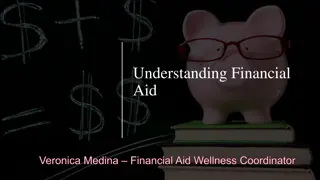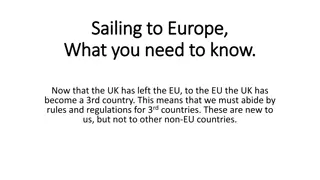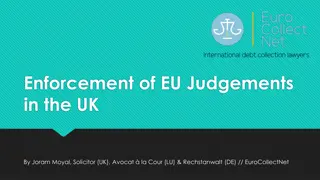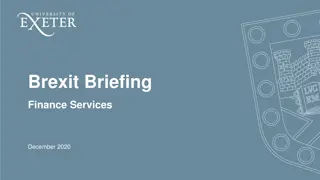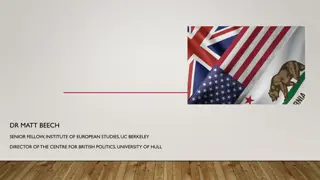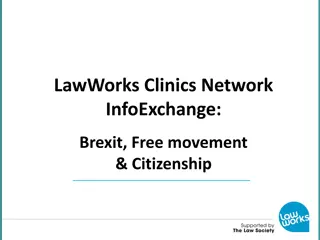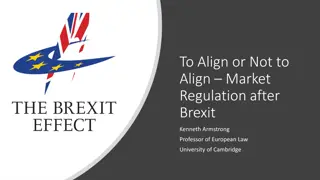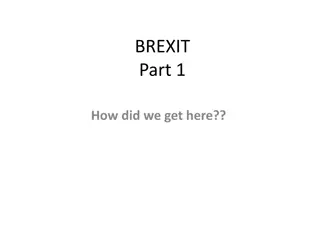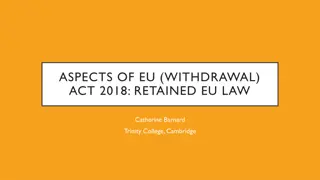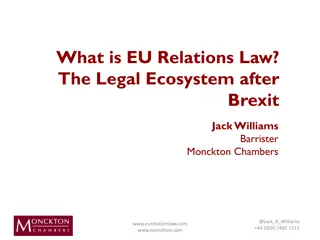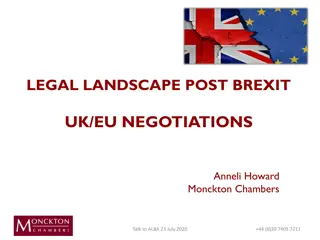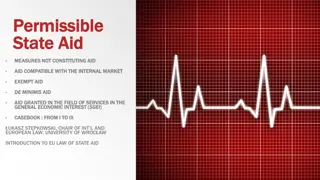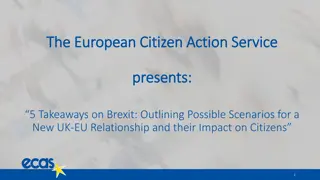Understanding State Aid Regulations in the EU Post-Brexit
State aid regulations play a crucial role in ensuring fair competition within the EU. Post-Brexit, the UK is likely to still be bound by these rules. State aid is defined as any form of aid granted by a Member State that distorts competition, posing challenges for trade between Member States. The EC controls state aid to prevent subsidy races and maintain a level playing field, promoting competitiveness, job creation, and innovation. Various tests determine the presence of state aid, such as assessing economic advantage and potential distortion of competition.
Download Presentation

Please find below an Image/Link to download the presentation.
The content on the website is provided AS IS for your information and personal use only. It may not be sold, licensed, or shared on other websites without obtaining consent from the author. Download presentation by click this link. If you encounter any issues during the download, it is possible that the publisher has removed the file from their server.
E N D
Presentation Transcript
Zoe Hollywood and Ian Anderson SG State Aid Team June 2018
Brexit Do we still need to abide by the rules? The UK retains all of its existing obligations and responsibilities as a Member State. One of these obligations involves continuing to implement EC rules on Competition, including those on State aid. While the future is presently unclear in terms of trade and competition with the EU, there is a strong possibility that any trade deals struck will require the UK to observe EU State aid rules in some form. The future shape of State aid control (in place of the EC s institutions) is yet to be agreed.
What is State Aid? State aid is formally defined in Article 107 of the Treaty on the Functioning of the European Union: e Functioning of the European Union: Save as otherwise provided in this Treaty, any aid granted by a Member State or through State Resources, in any form whatsoever, which distorts, or threatens to distort competition by favouring certain undertakings or the production of certain goods, shall insofar as it affects trade between Member States, be incompatible with the internal market
the EC Control State Aid? Why does the EC Control State Aid? To avoid a subsidy race . To ensure a level playing field across all EU Member States. To maintain competitiveness and encourage job creation, innovation and restructuring.
State Aid Tests (based on Article 107(1) of The Treaty) Is the aid from a Member State or through State resources? Does it confer a selective economic advantage on an undertaking? Does it have the potential to distort competition? Is it likely to affect intra-community trade? 1. 2. 3. 4. All need to be met for State aid to be present
Test 1- Is the aid from a Member State or through State resources? Yes Loans and guarantees at below market rates Tax reliefs or exemptions Grants to firms Provision of goods and services at preferential rates Free or subsidised advice/consultancy or training Sale of public land at less than market value Public funding of infrastructure benefitting a specific operator/end user No Private finance, donations.
Test 2 Does it confer a selective economic advantage on an undertaking? Yes Selective - direct grants or subsidies to named undertakings or specific sectors. Advantage economic benefit that an undertaking would not have obtained under normal market conditions. No General measures (corporation tax, apprenticeships) must apply to every undertaking in the member state. Goods/Services procured without subsidy Market Economy Investor/Operator Principle (MEIP/MEOP) Loans/Investments on commercial terms
Test 3 - Does it have the potential to distort competition? Yes If a measure granted by State improves the competitive position of the recipient compared to other undertakings with which it competes. No Service subject to a legal monopoly and does not compete with other liberalised services.
Test 4 Is it likely to affect intra- community trade? Yes If a measure strengthens the competitive position of the recipient compared to other undertakings competing in intra- Community trade. Trying to attract business from customers in other Member States. No Goods/services purely local. No material impact on intra-community trade.
The four tests summarised: The The The The measure has the potential to distort competition YES TO ALL FOUR TESTS measure involves the transfer of state resources beneficiaries receive a selective economic advantage measure is likely to affect intra community trade Y E S Y E S Y E S Y E S NO NO NO NO State Aid is unlikely to be present State Aid is likely to be present
What do we do when State aid is present?
Regulations which provide State aid cover Article 107(2) & (3) of the TFEU Sectoral Guidelines & Frameworks Services of General Economic Interest General Block Exemption Regulation De minimis Regulations
Azores Criteria Under State aid rules, national tax rates must not vary in a way that is more favourable to individual regions if a selective economic advantage is provided to businesses operating in those regions. when tax powers are devolved within a Member State, the regional authority to which they are devolved must bear a sufficient degree of fiscal and economic autonomy from central government.
Azores Criteria 1 - Institutionally autonomous the decision must be taken by an authority with its own constitutional, political and administrative status separate from that of central government. 2 - Procedurally autonomous the decision must be taken through a procedure in which central government does not have the power to intervene in the setting of the tax rate and where the regional authority has no obligation to take the central government s interests into account. 3 - Economically autonomous the lower tax rate within a region must not be cross-subsidised or financed by central government, so that the economic consequences of the reduction are borne by the region itself.
Case precedent German Tax Reduction for flights to and from North Sea islands (SA.32020) Irish Air Travel Tax Case (SA.29064)
Air Discount Scheme The ADS operates under Article 51 of the EC s General Block Exemption Regulation (GBER) (Social aid for transport for residents of remote regions). The GBER allows for aid that: Aid shall be for the benefit of final consumers who have their normal residence in remote regions. The aid shall be granted for passenger transport on a route linking an airport or port in a remote region with another airport or port within the European Economic Area. The aid shall be granted without discrimination as to the identity of the carrier or type of service and without limitation as to the precise route to or from the remote region. The maximum eligible costs shall be the price of a return ticket from or to the remote region, including all taxes and charges invoiced by the carrier to the consumer.
Consequences Potential investigation by Commission (ten year rule). Aid can be halted. Any illegal aid must be repaid, with interest, by the recipient. Potential action by aggrieved competitors possibility of recovery order and damages by national courts. Undermines UK and Scottish Government commitment to tighter State aid control and best use of public resources.



